Charles E W Bean, Diaries, AWM38 3DRL 606/268/1 - 1917 - 1936 - Part 9
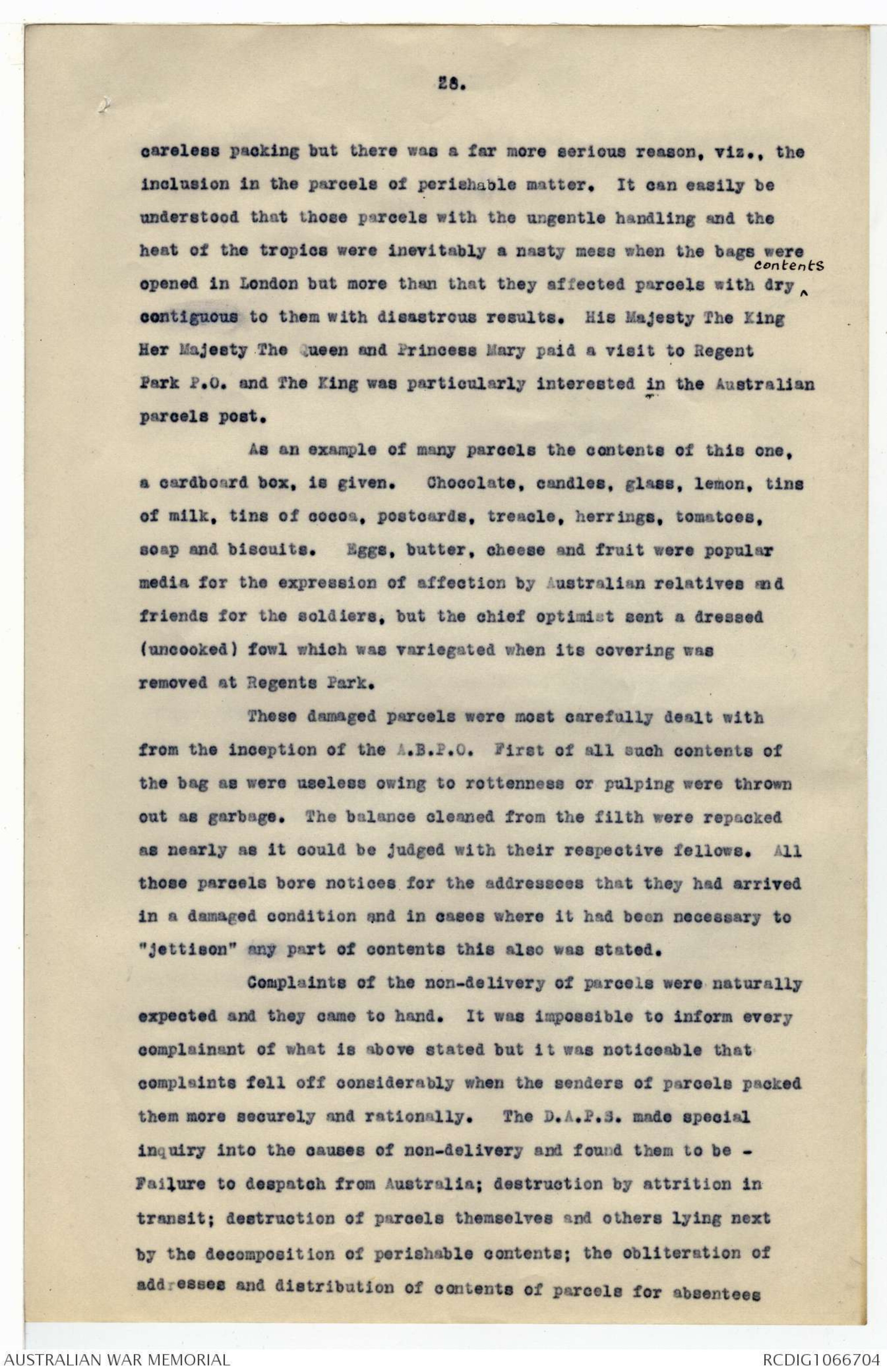
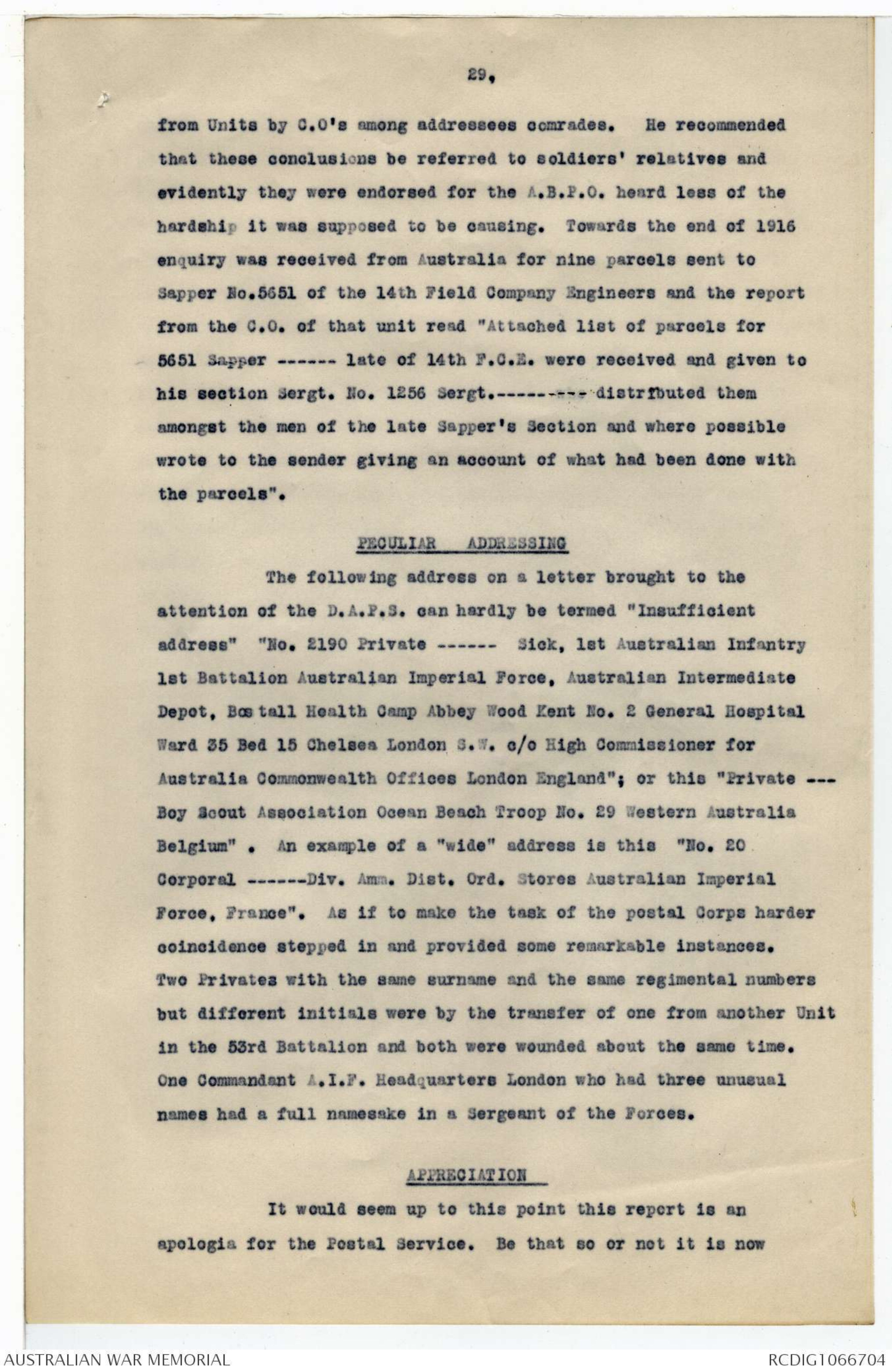
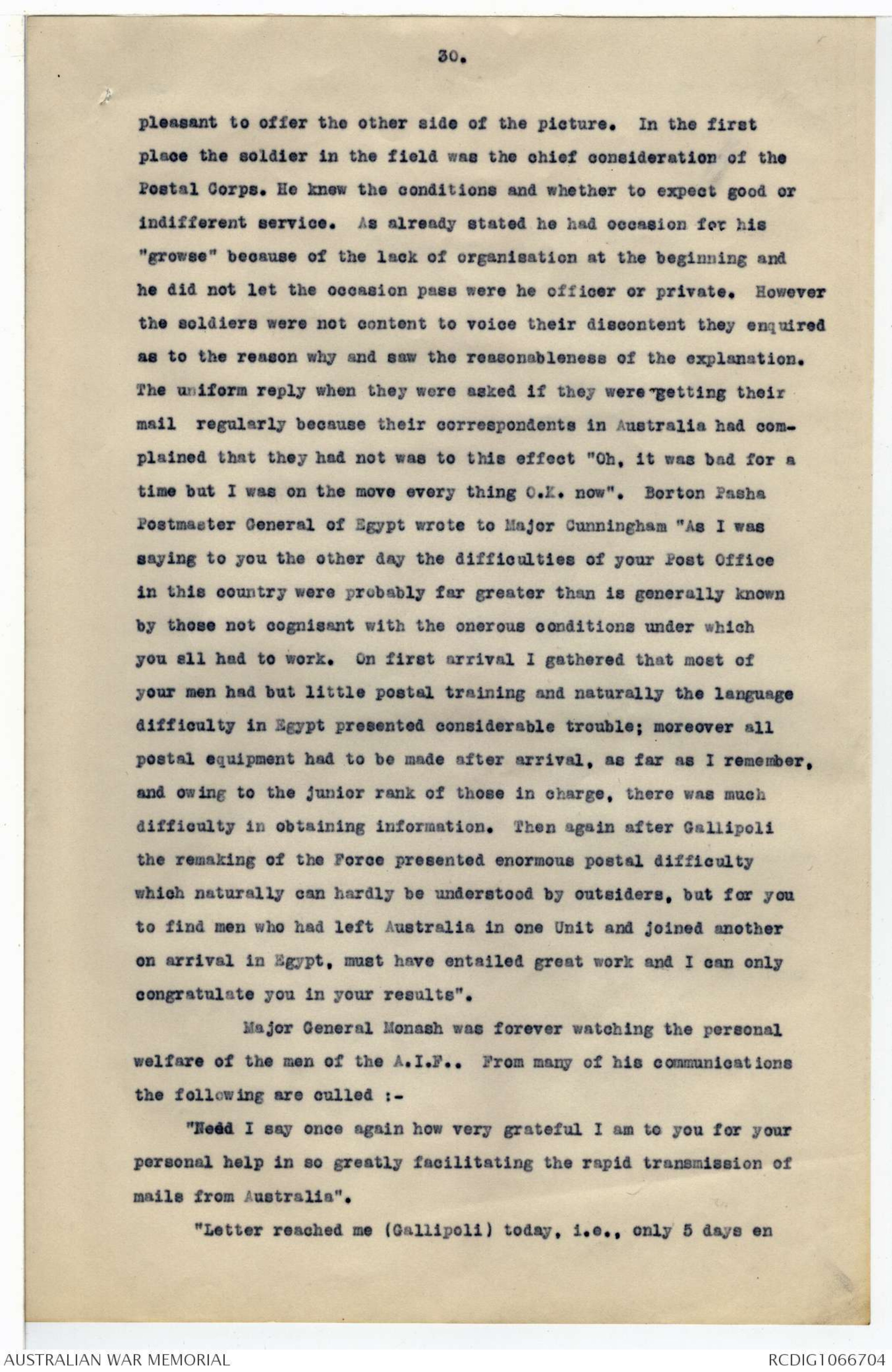
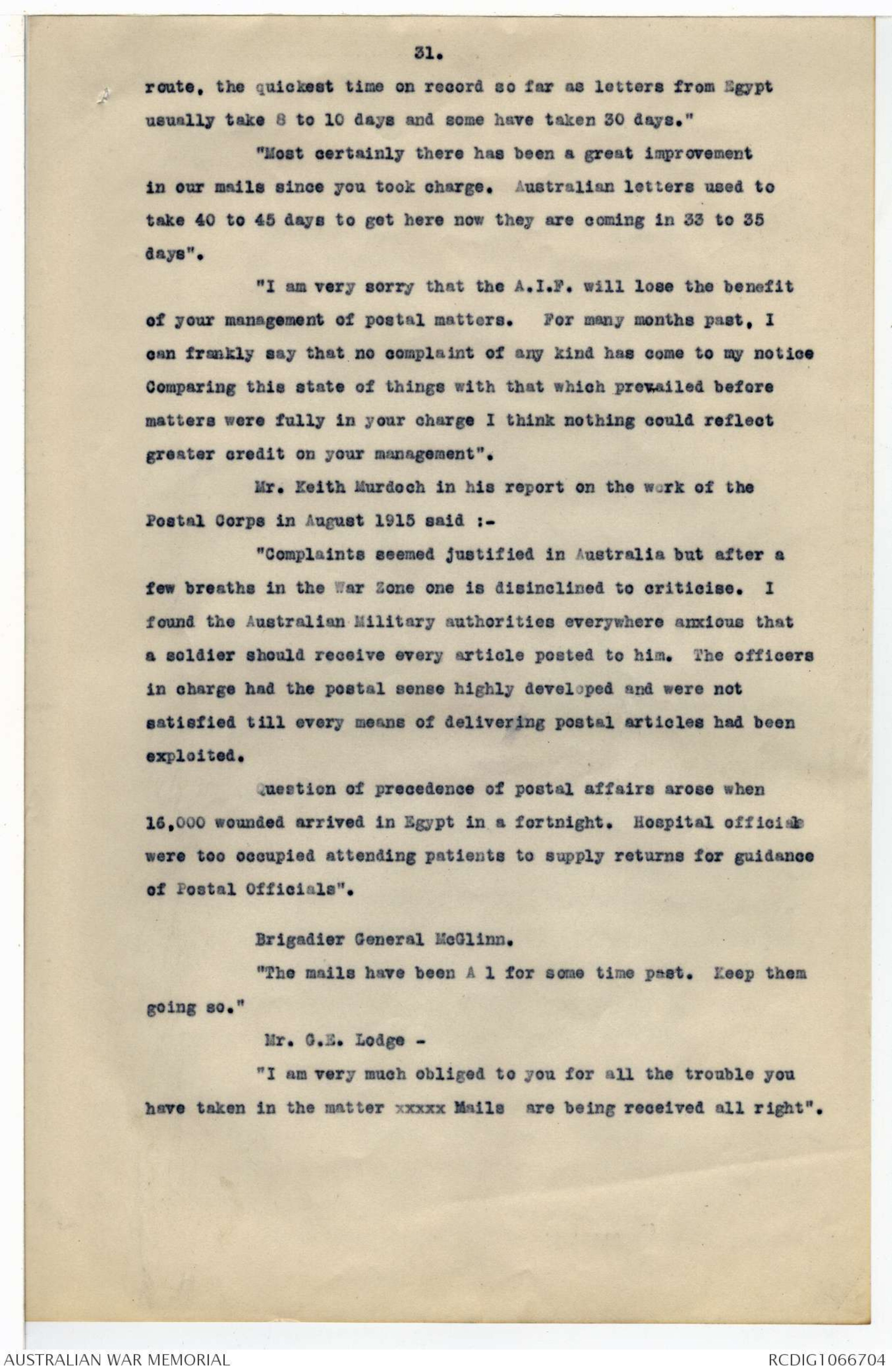
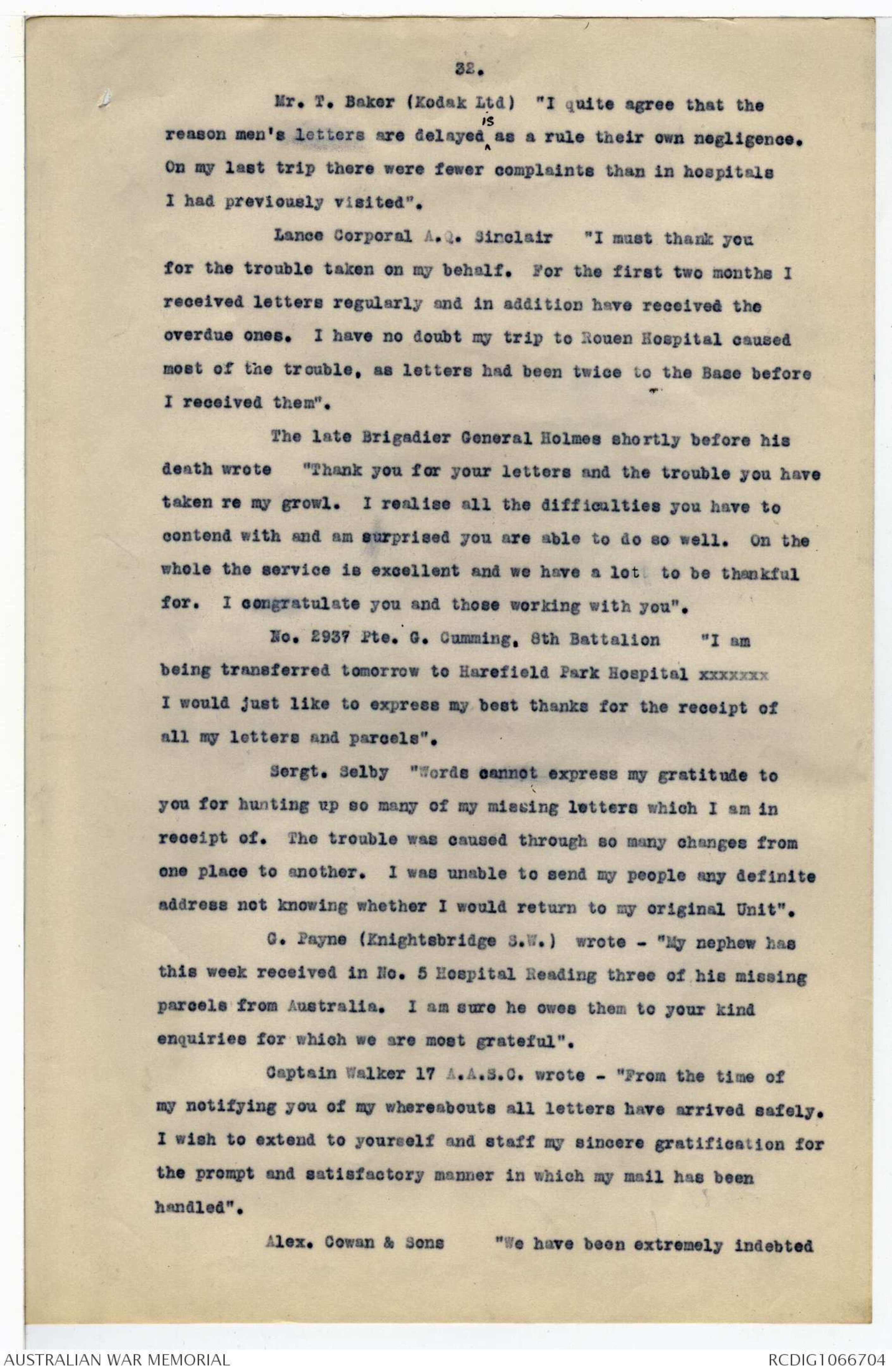
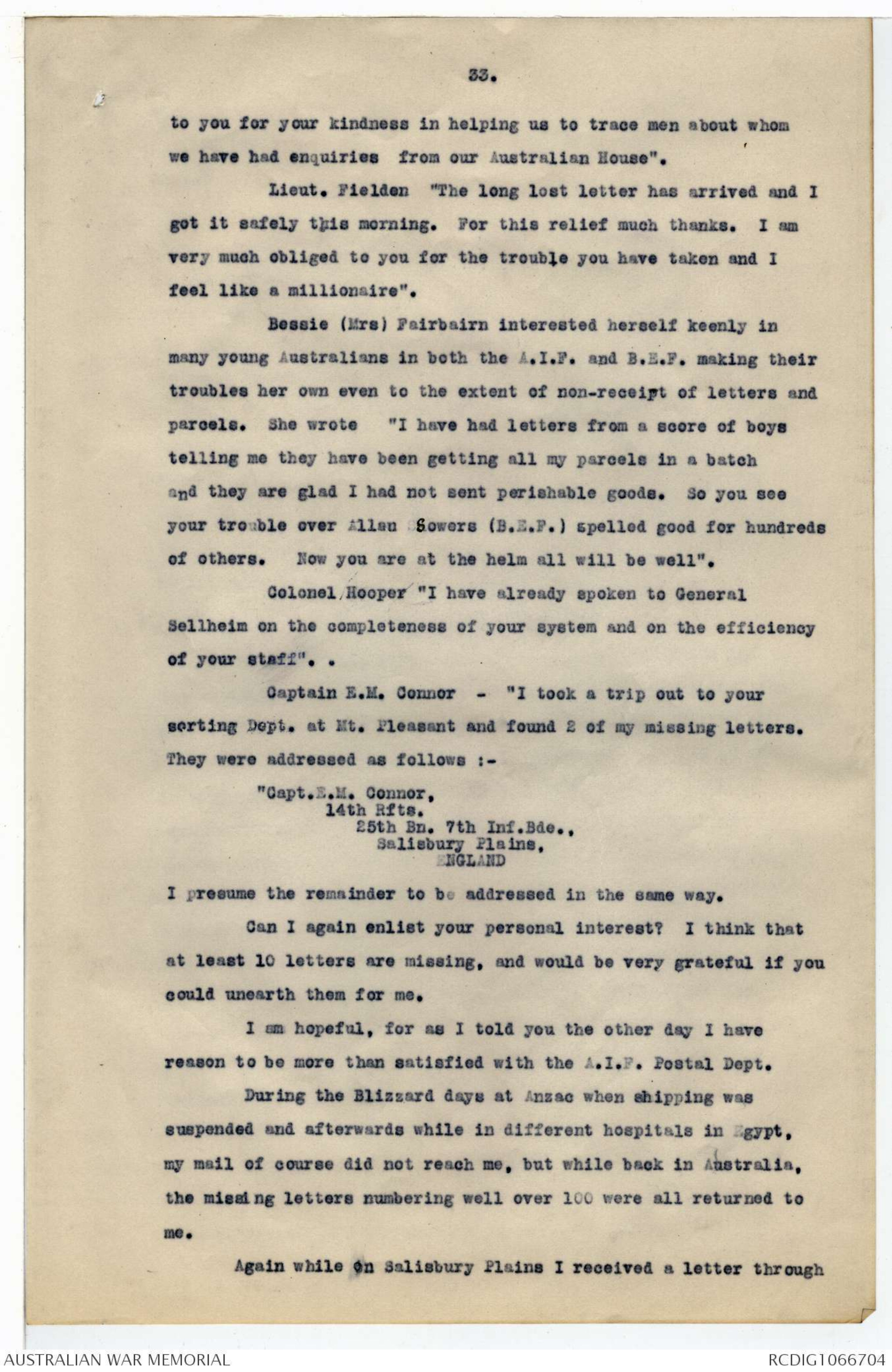
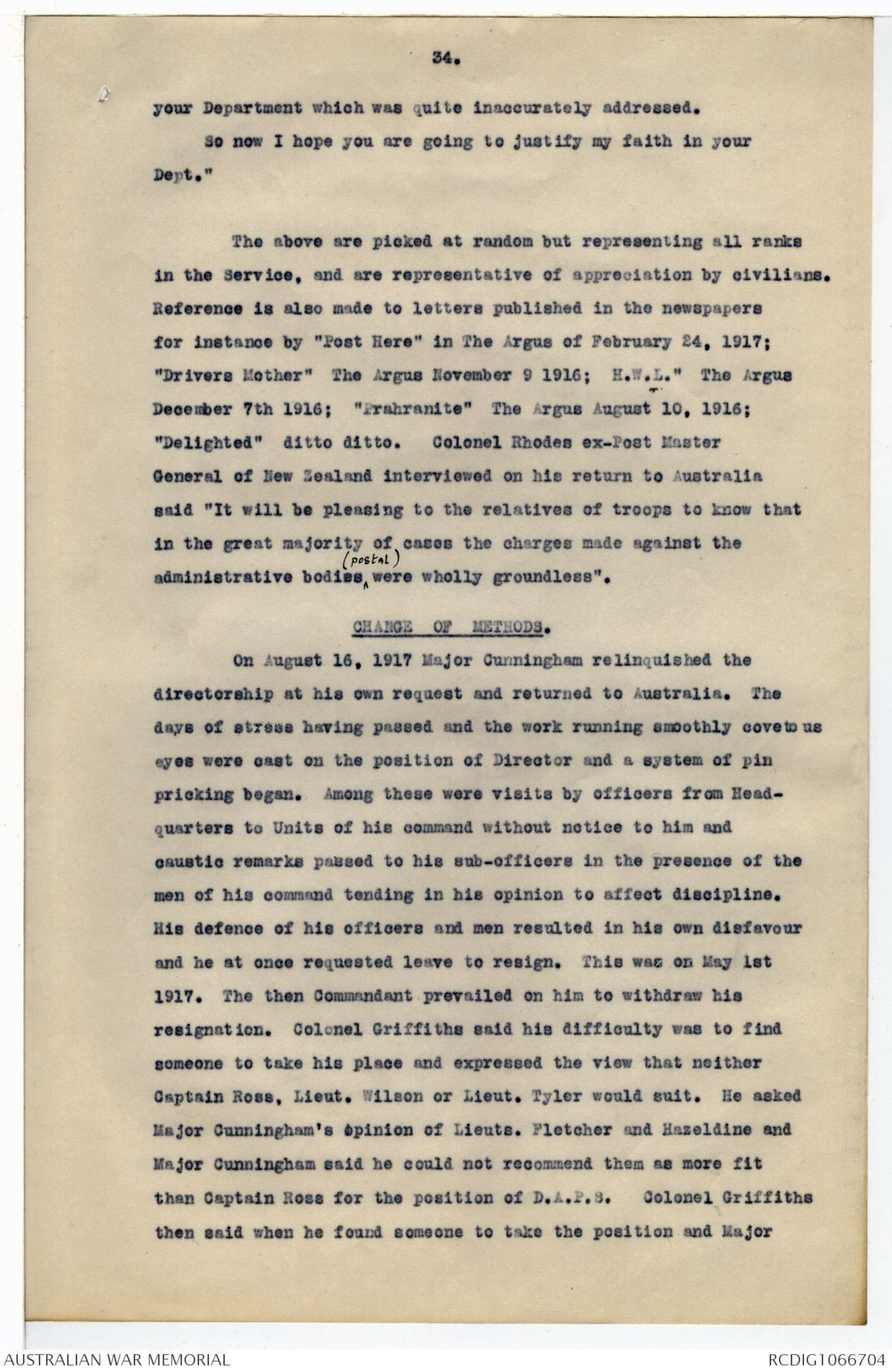
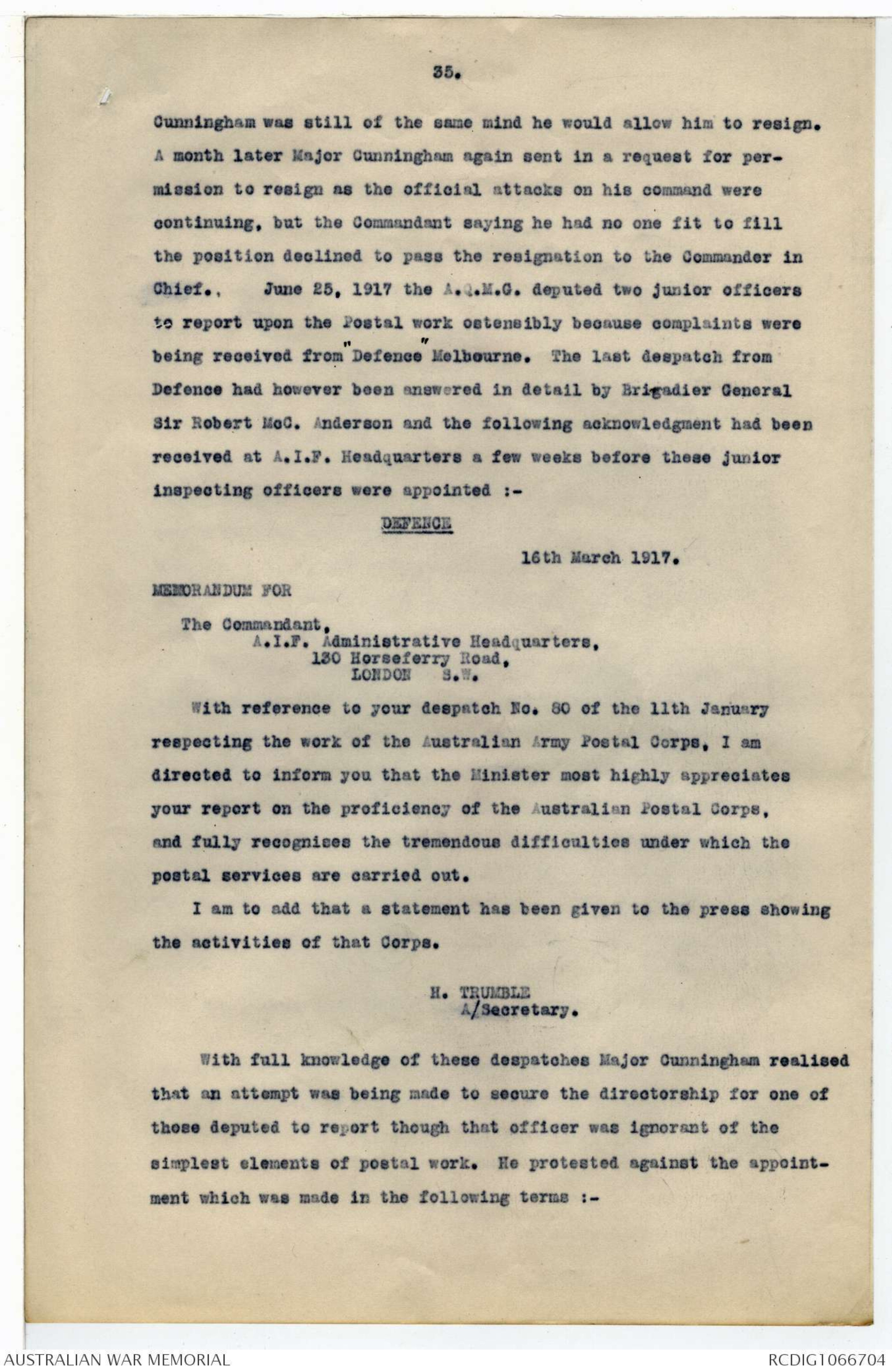
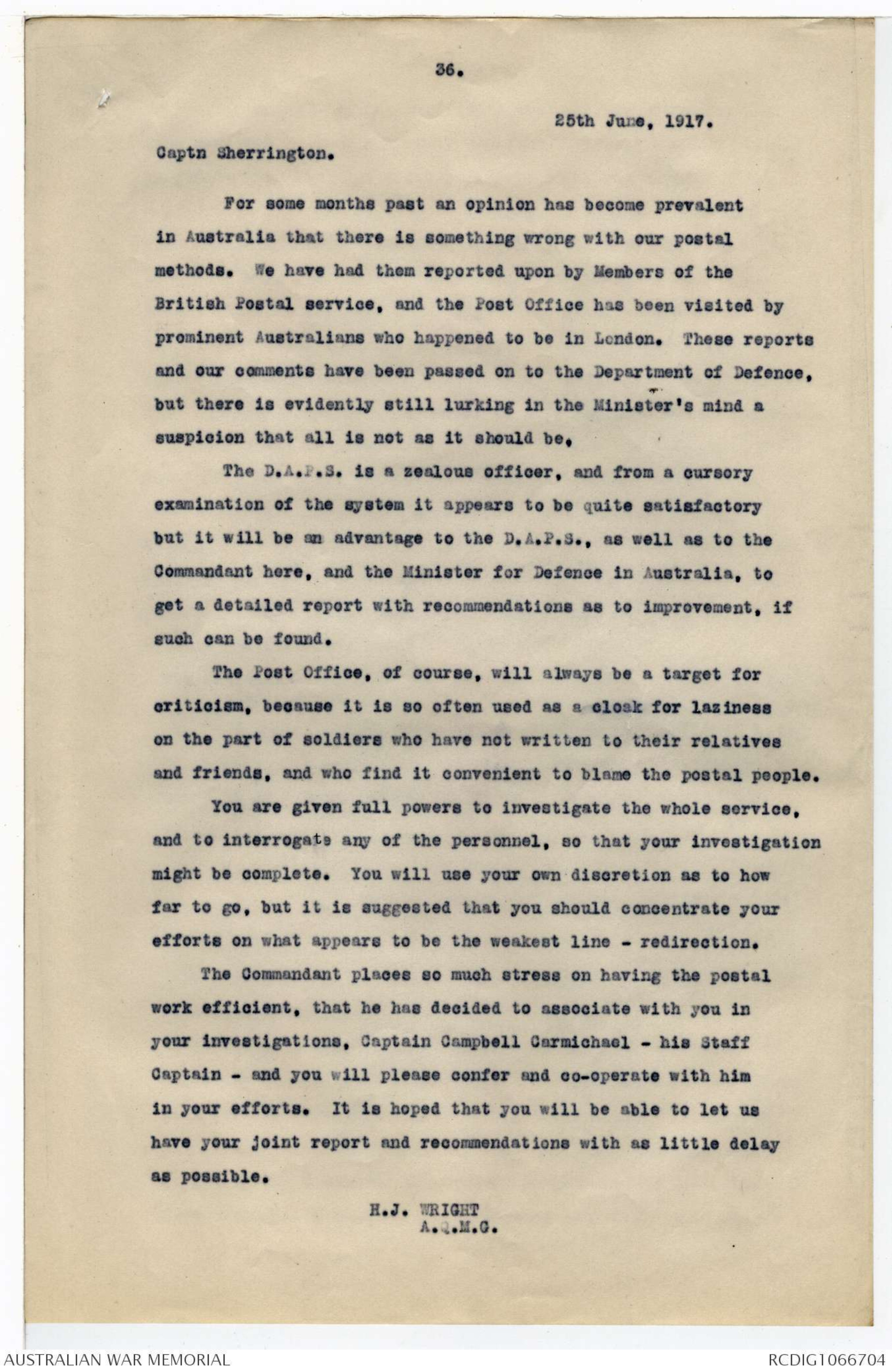
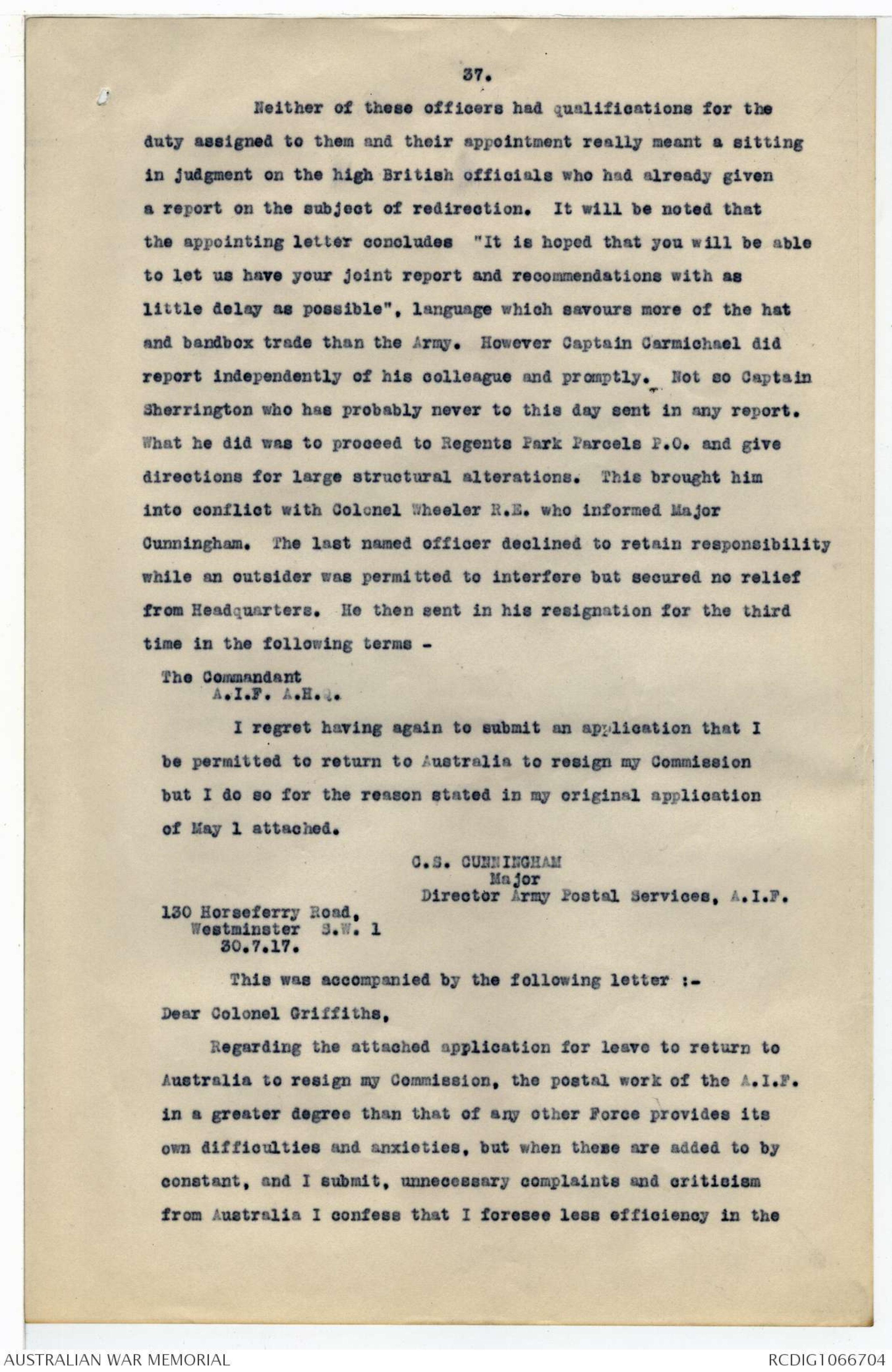
28.
careless packing but there was a far more serious reason, viz., the
inclusion in the parcels of perishable matter. It can easily be
understood that those parcels with the ungentle handling and the
heat of the tropics were inevitably a nasty mess when the bags were
opened in London but more than that they affected parcels with dry ^contents
contiguous to them with disastrous results. His Majesty The King
Her Majesty The Queen and Princess Mary paid a visit to Regent
Park P.O. and The King was particularly interested in the Australian
parcels post.
As an example of many parcels the contents of this one,
a cardboard box, is given. Chocolate, candles, glass, lemon, tins
of milk, tins of cocoa, postcards, treacle, herrings, tomatoes,
soap and biscuits. Eggs, butter, cheese and fruit were popular
media for the expression of affection by Australian relatives and
friends for the soldiers, but the chief optimist sent a dressed
(uncooked) fowl which was variegated when its covering was
removed at Regents Park.
These damaged parcels were most carefully dealt with
from the inception of the A.B.P.O. First of all such contents of
the bag as were useless owing to rottenness or pulping were thrown
out as garbage. The balance cleaned from the filth were repacked
as nearly as it could be judged with their respective fellows. All
those parcels bore notices for the addressees that they had arrived
in a damaged condition and in cases where it had been necessary to
"jettison" any part of contents this also was stated.
Complaints of the non-delivery of parcels were naturally
expected and they came to hand. It was impossible to inform every
complainant of what is above stated but it was noticeable that
complaints fell off considerably when the senders of parcels packed
them more securely and rationally. The D.A.P.S. made special
inquiry into the causes of non-delivery and found them to be -
Failure to despatch from Australia; destruction by attrition in
transit; destruction of parcels themselves and others lying next
by the decomposition of perishable contents; the obliteration of
addresses and distribution of contents of parcels for absentees
29.
from Units by C.O's among addressees comrades. He recommended
that these conclusions be referred to soldiers' relatives and
evidently they were endorsed for the A.B.P.O. heard less of the
hardship it was supposed to be causing. Towards the end of 1916
enquiry was received from Australia for nine parcels sent to
Sapper No.5651 of the 14th Field Company Engineers and the report
from the C.O. of that unit read "Attached list of parcels for
5651 Sapper ------- late of 14th F.C.E. were received and given to
his section Sergt. No. 1256 Sergt.------ distributed them
amongst the men of the late Sapper's Section and where possible
wrote to the sender giving an account of what had been done with
the parcels".
PECULIAR ADDRESSING
The following address on a letter brought to the
attention of the D.A.P.S. can hardly be termed "Insufficient
address" "No. 2190 Private ----- Sick, 1st Australian Infantry
1st Battalion Australian Imperial Force, Australian Intermediate
Depot, Bostall Health Camp Abbey Wood Kent No. 2 General Hospital
Ward 35 Bed 15 Chelsea London S.W. c/o High Commissioner for
Australia Commonwealth Offices London England"; or this "Private ---
Boy Scout Association Ocean Beach Troop No. 29 Western Australia
Belgium". An example of a "wide" address is this "No. 20
Corporal –--- Div. Amm. Dist. Ord. Stores Australian Imperial
Force, France". As if to make the task of the postal Corps harder
coincidence stepped in and provided some remarkable instances.
Two Privates with the same surname and the same regimental numbers
but different initials were by the transfer of one from another Unit
in the 53rd Battalion and both were wounded about the same time.
One Commandant A.I.F. Headquarters London who had three unusual
names had a full namesake in a Sergeant of the Forces.
APPRECIATION
It would seem up to this point this report is an
apologia for the Postal Service. Be that so or not it is now
30.
pleasant to offer the other side of the picture. In the first
place the soldier in the field was the chief consideration of the
Postal Corps. He knew the conditions and whether to expect good or
indifferent service. As already stated he had occasion for his
"growse" because of the lack of organisation at the beginning and
he did not let the occasion pass were he officer or private. However
the soldiers were not content to voice their discontent they enquired
as to the reason why and saw the reasonableness of the explanation.
The uniform reply when they were asked if they were getting their
mail regularly because their correspondents in Australia had complained
that they had not was to this effect "Oh, it was bad for a
time but I was on the move every thing O.K. now". Borton Pasha
Postmaster General of Egypt wrote to Major Cunningham "As I was
saying to you the other day the difficulties of your Post Office
in this country were probably far greater than is generally known
by those not cognisant with the onerous conditions under which
you all had to work. On first arrival I gathered that most of
your men had but little postal training and naturally the language
difficulty in Egypt presented considerable trouble; moreover all
postal equipment had to be made after arrival, as far as I remember,
and owing to the junior rank of those in charge, there was much
difficulty in obtaining information. Then again after Gallipoli
the remaking of the Force presented enormous postal difficulty
which naturally can hardly be understood by outsiders, but for you
to find men who had left Australia in one Unit and joined another
on arrival in Egypt, must have entailed great work and I can only
congratulate you in your results".
Major General Monash was forever watching the personal
welfare of the men of the A.I.F.. From many of his communications
the following are culled :-
"Need I say once again how very grateful I am to you for your
personal help in so greatly facilitating the rapid transmission of
mails from Australia".
"Letter reached me (Gallipoli) today, i.e., only 5 days en
31.
route, the quickest time on record so far as letters from Egypt
usually take 8 to 10 days and some have taken 30 days."
"Most certainly there has been a great improvement
in our mails since you took charge. Australian letters used to
take 40 to 45 days to get here now they are coming in 33 to 35
days".
"I am very sorry that the A.I.F. will lose the benefit
of your management of postal matters. For many months past, I
can frankly say that no complaint of any kind has come to my notice
Comparing this state of things with that which prevailed before
matters were fully in your charge I think nothing could reflect
greater credit on your management".
Mr. Keith Murdoch in his report on the work of the
Postal Corps in August 1915 said:-
"Complaints seemed justified in Australia but after a
few breaths in the War Zone one is disinclined to criticise. I
found the Australian Military authorities everywhere anxious that
a soldier should receive every article posted to him. The officers
in charge had the postal sense highly developed and were not
satisfied till every means of delivering postal articles had been
exploited.
Question of precedence of postal affairs arose when
16,000 wounded arrived in Egypt in a fortnight. Hospital officials
were too occupied attending patients to supply returns for guidance
of Postal Officials".
Brigadier General McGlinn.
"The mails have been A 1 for some time past. Keep them
going so."
Mr. G.E. Lodge -
"I am very much obliged to you for all the trouble you
have taken in the matter xxxxx Mails are being received all right".
32.
Mr. T. Baker (Kodak Ltd) "I quite agree that the
reason men's letters are delayed ^is as a rule their own negligence.
On my last trip there were fewer complaints than in hospitals
I had previously visited".
Lance Corporal A.Q. Sinclair "I must thank you
for the trouble taken on my behalf. For the first two months I
received letters regularly and in addition have received the
overdue ones. I have no doubt my trip to Rouen Hospital caused
most of the trouble, as letters had been twice to the Base before
I received them".
The late Brigadier General Holmes shortly before his
death wrote "Thank you for your letters and the trouble you have
taken re my growl. I realise all the difficulties you have to
contend with and am surprised you are able to do so well. On the
whole the service is excellent and we have a lot to be thankful
for. I congratulate you and those working with you".
No. 2937 Pte. G. Cumming, 8th Battalion "I am
being transferred tomorrow to Harefield Park Hospital xxxxxx
I would just like to express my best thanks for the receipt of
all my letters and parcels".
Sergt. Selby "Words cannot express my gratitude to
you for hunting up so many of my missing letters which I am in
receipt of. The trouble was caused through so many changes from
one place to another. I was unable to send my people any definite
address not knowing whether I would return to my original Unit".
C. Payne (Knightsbridge S.W.) wrote - "My nephew has
this week received in No. 5 Hospital Reading three of his missing
parcels from Australia. I am sure he owes them to your kind
enquiries for which we are most grateful".
Captain Walker 17 A.A.S.C. wrote - "From the time of
my notifying you of my whereabouts all letters have arrived safely.
I wish to extend to yourself and staff my sincere gratification for
the prompt and satisfactory manner in which my mail has been
handled".
Alex. Cowan & Sons "We have been extremely indebted
33.
to you for your kindness in helping us to trace men about whom
we have had enquiries from our Australian House".
Lieut. Fielden "The long lost letter has arrived and I
got it safely this morning. For this relief much thanks. I am
very much obliged to you for the trouble you have taken and I
feel like a millionaire".
Bessie (Mrs) Fairbairn interested herself keenly in
many young Australians in both the A.I.F. and B.E.F. making their
troubles her own even to the extent of non-receipt of letters and
parcels. She wrote "I have had letters from a score of boys
telling me they have been getting all my parcels in a batch
and they are glad I had not sent perishable goods. So you see
your trouble over Allan Sowers (B.E.F.) spelled good for hundreds
of others. Now you are at the helm all will be well".
Colonel Hooper "I have already spoken to General
Sellheim on the completeness of your system and on the efficiency
of your staff. .
Captain E.M. Connor - "I took a trip out to your
sorting Dept. at Mt. Pleasant and found 2 of my missing letters.
They were addressed as follows :-
"Capt.E.M. Connor,
14th Rfts.
25th Bn. 7th Inf.Bde.,
Salisbury Plains,
ENGLAND
I presume the remainder to be addressed in the same way.
Can I again enlist your personal interest? I think that
at least 10 letters are missing, and would be very grateful if you
could unearth them for me.
I an hopeful, for as I told you the other day I have
reason to be more than satisfied with the A.I.F. Postal Dept.
During the Blizzard days at Anzac when shipping was
suspended and afterwards while in different hospitals in Egypt,
my mail of course did not reach me, but while back in Australia
the missing letters numbering well over 100 were all returned to
me.
Again while on Salisbury Plains I received a letter through
34.
your Department which was quite inaccurately addressed.
So now I hope you are going to justify my faith in your
Dept."
The above are picked at random but representing all ranks
in the Service, and are representative of appreciation by civilians.
Reference is also made to letters published in the newspapers
for instance by "Post Here” in The Argus of February 24, 1917;
"Drivers Mother" The Argus November 9 1916; H.W.L." The Argus
December 7th 1916; "Prahranite" The Argus August 10, 1916;
"Delighted" ditto ditto. Colonel Rhodes ex-Post Master
General of New Zealand interviewed on his return to Australia
said "It will be pleasing to the relatives of troops to know that
in the great majority of cases the charges made against the administrative bodies ^(postal) were wholly groundless".
CHANGE OF METHODS.
On August 16, 1917 Major Cunningham relinquished the
directorship at his own request and returned to Australia. The
days of stress having passed and the work running smoothly covetous
eyes were cast on the position of Director and a system of pin
pricking began. Among these were visits by officers from Headquarters
to Units of his command without notice to him and
caustic remarks passed to his sub-officers in the presence of the
men of his command tending in his opinion to affect discipline.
His defence of his officers and men resulted in his own disfavour
and he at once requested leave to resign. This was on May 1st
1917. The then Commandant prevailed on him to withdraw his
resignation. Colonel Griffiths said his difficulty was to find
someone to take his place and expressed the view that neither
Captain Ross, Lieut. Wilson or Lieut. Tyler would suit. He asked
Major Cunningham's opinion of Lieuts. Fletcher and Hazeldine and
Major Cunningham said he could not recommend them as more fit
than Captain Ross for the position of D.A.P.S. Colonel Griffiths
then said when he found someone to take the position and Major
35.
Cunningham was still of the same mind he would allow him to resign.
A month later Major Cunningham again sent in a request for permission
to resign as the official attacks on his command were
continuing, but the Commandant saying he had no one fit to fill
the position declined to pass the resignation to the Commander in
Chief. June 25, 1917 the A.Q.M.C. deputed two junior officers
to report upon the Postal work ostensibly because complaints were
being received from "Defence" Melbourne. The last despatch from
Defence had however been answered in detail by Brigadier General
Sir Robert McC. Anderson and the following acknowledgment had been
received at A.I.F. Headquarters a few weeks before these junior
inspecting officers were appointed :-
DEFENCE
16th March 1917.
MEMORANDUM FOR
The Commandant,
A.I.F. Administrative Headquarters,
130 Horseferry Road,
LONDON S.W.
With reference to your despatch No. 80 of the 11th January
respecting the work of the Australian Army Postal Corps, I am
directed to inform you that the Minister most highly appreciates
your report on the proficiency of the Australian Postal Corps,
and fully recognises the tremendous difficulties under which the
postal services are carried out.
I am to add that a statement has been given to the press showing
the activities of that Corps.
H. TRUMBLE
A/Secretary.
With full knowledge of these despatches Major Cunningham realised
that an attempt was being made to secure the directorship for one of
those deputed to report though that officer was ignorant of the
simplest elements of postal work. He protested against the
appointment
which was made in the following terms:
36.
25th June, 1917.
Captn Sherrington.
For some months past an opinion has become prevalent
in Australia that there is something wrong with our postal
methods. We have had them reported upon by Members of the
British Postal service, and the Post Office has been visited by
prominent Australians who happened to be in London. These reports
and our comments have been passed on to the Department of Defence,
but there is evidently still lurking in the Minister's mind a
suspicion that all is not as it should be,
The D.A.P.S. is a zealous officer, and from a cursory
examination of the system it appears to be quite satisfactory
but it will be an advantage to the D.A.P.S., as well as to the
Commandant here, and the Minister for Defence in Australia, to
get a detailed report with recommendations as to improvement, if
such can be found.
The Post Office, of course, will always be a target for
criticism, because it is so often used as a cloak for laziness
on the part of soldiers who have not written to their relatives
and friends, and who find it convenient to blame the postal people.
You are given full powers to investigate the whole service,
and to interrogate any of the personnel, so that your investigation
might be complete. You will use your own discretion as to how
far to go, but it is suggested that you should concentrate your
efforts on what appears to be the weakest line - redirection.
The Commandant places so much stress on having the postal
work efficient, that he has decided to associate with you in
your investigations, Captain Campbell Carmichael - his Staff
Captain - and you will please confer and co-operate with him
in your efforts. It is hoped that you will be able to let us
have your joint report and recommendations with as little delay
as possible.
H.J. WRICHT
A.Q.M.C.
37.
Neither of these officers had qualifications for the
duty assigned to them and their appointment really meant a sitting
in judgment on the high British officials who had already given
a report on the subject of redirection. It will be noted that
the appointing letter concludes "It is hoped that you will be able
to let us have your joint report and recommendations with as
little delay as possible", language which savours more of the hat
and bandbox trade than the Army. However Captain Carmichael did
report independently of his colleague and promptly. Not so Captain
Sherrington who has probably never to this day sent in any report.
What he did was to proceed to Regents Park Parcels P.O. and give
directions for large structural alterations. This brought him
into conflict with Colonel Wheeler R.E. who informed Major
Cunningham. The last named officer declined to retain responsibility
while an outsider was permitted to interfere but secured no relief
from Headquarters. He then sent in his resignation for the third
time in the following terms -
The Commandant
A.I.F. A.H.Q.
I regret having again to submit an application that I
be permitted to return to Australia to resign my Commission
but I do so for the reason stated in my original application
of May 1 attached.
C.S. CUNNINGHAM
Major
Director Army Postal Services, A.I.F.
130 Horseferry Road,
Westminster S.W.1
30.7.17.
This was accompanied by the following letter :-
Dear Colonel Griffiths,
Regarding the attached application for leave to return to
Australia to resign my Commission, the postal work of the A.I.F.
in a greater degree than that of any other Force provides its
own difficulties and anxieties, but when these are added to by
constant, and I submit, unnecessary complaints and criticism
from Australia I confess that I foresee less efficiency in the
 Sam scott
Sam scottThis transcription item is now locked to you for editing. To release the lock either Save your changes or Cancel.
This lock will be automatically released after 60 minutes of inactivity.